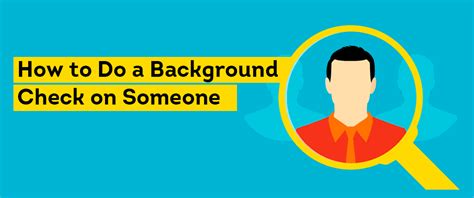How to Do a Background Check on Someone: A Comprehensive Guide
Knowing how to conduct a background check can be crucial in various situations, from hiring employees to ensuring the safety of your family. This guide provides a comprehensive overview of the process, highlighting legal considerations and different methods available. Remember, always prioritize ethical and legal practices when performing a background check.
Understanding the Legalities of Background Checks
Before diving into the "how-to," it's essential to understand the legal landscape surrounding background checks. Laws vary by state and country, and violating these laws can lead to serious consequences. Generally, you need a legitimate purpose to conduct a background check. This purpose might include:
- Employment: Verifying a candidate's qualifications and history is a common and often legally required practice.
- Tenant Screening: Landlords frequently conduct background checks to assess a prospective tenant's reliability.
- Personal Safety: In certain circumstances, you might need a background check to ensure the safety of yourself or your family.
However, conducting a background check without a legitimate purpose can be illegal. Always check your local and state laws before proceeding. Improper use of background check information can result in legal repercussions.
Types of Background Checks
Several types of background checks offer varying levels of detail. Choosing the right one depends on your specific needs and legal permissions.
1. Basic Background Checks
These typically include:
- Name and Date of Birth Verification: Confirming the individual's identity.
- Address History: Identifying previous residences.
- Criminal Records Search: Checking for felony and misdemeanor convictions. Note: The extent of criminal records information accessible varies by jurisdiction.
2. Enhanced Background Checks
These checks expand upon basic checks by including:
- More Extensive Criminal Record Searches: Potentially including minor offenses and records from multiple jurisdictions.
- Credit Report: Assessing the individual's financial responsibility. Requires explicit consent in many cases.
- Employment History Verification: Contacting previous employers to confirm employment details.
- Education Verification: Confirming educational credentials.
- Driving Records: Checking for driving violations and accidents.
3. Professional Background Checks
These are often used for employment purposes and might include:
- Professional License Verification: Checking for valid licenses and certifications.
- Sanctions and Watchlist Screening: Checking against lists of individuals subject to sanctions or other restrictions.
How to Perform a Background Check
Several avenues exist for conducting background checks:
- Professional Background Check Companies: These companies provide comprehensive services, but they often come with a cost.
- Public Records Websites: Many websites offer access to public records, such as court records and property records. However, navigating these sites can be challenging, and the information may be incomplete or inaccurate.
- Social Media: While not a formal background check, social media platforms can provide insights into an individual's character and activities. However, relying solely on social media can be unreliable and potentially biased.
Remember to always verify information from multiple sources and exercise caution when interpreting the findings.
Ethical Considerations
It's crucial to conduct background checks ethically and responsibly. Always:
- Obtain consent when required.
- Use the information responsibly and only for its intended purpose.
- Respect individual privacy.
- Avoid discrimination based on background check results.
Performing a background check requires careful consideration of legal and ethical implications. Understanding the available options and using them responsibly is key to obtaining the information you need while respecting individual rights and adhering to the law. When in doubt, consult with a legal professional.
